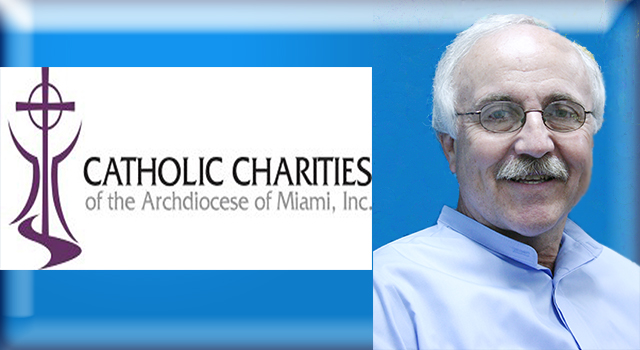By Tom Tracy - Florida Catholic
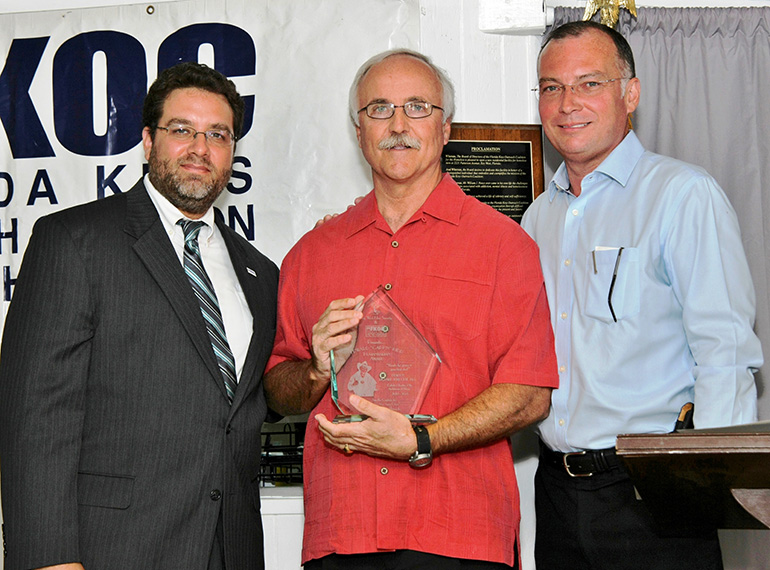
Photographer: COURTESY PHOTO | Ron Roberts
Deacon Richard Turcotte, center, is honored in 2013 by the Florida Keys Outreach Coalition for his service to the homeless and needy in Monroe County. Presenting him with the "Capt'n" Kidd Humanitarian Award are FKOC Chairman Sam Kaufman, left, and Rev. Stephen Braddock, CEO.
WILTON MANORS | After 20 years of overseeing an array of services to the needy of South Florida, Deacon Richard Turcotte, CEO of Catholic Charities in the Archdiocese of Miami, will officially retire effective June 1.
Peter Routsis-Arroyo, previously head of Catholic Charities in the Diocese of Venice, has taken the helm effective immediately. (See accompanying story)
A native of Miami for all intents and purposes (he arrived in Florida as a sixth-month-old), Deacon Turcotte took over as CEO of the agency in August 1998.
A graduate of Archbishop Curley High School in Miami, he studied at Spring Hill College in Mobile, Alabama, before returning to Florida. He sat down with the Florida Catholic to reflect on his three decades of service. The interview has been edited for brevity.
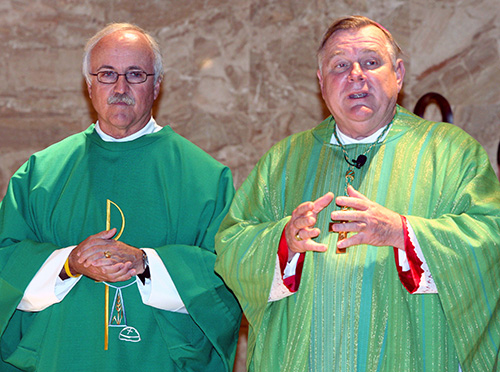
Photographer: MARLENE QUARONI | FC
Deacon Richard Turcotte, left, Catholic Charities' chief executive officer since 1998, assists at the agency's 80th anniversary Mass in 2011. The Mass was celebrated by Archbishop Thomas Wenski, who served as Catholic Charities CEO from 1995 to 1998.
FC: How has the agency changed over your term of service here?
Today we are a $32 million organization with 12 different nationally accredited programs from Key West to Pompano Beach. The agency has grown tremendously during that 20-year span, now with more than 300 employees. During my tenure, we have attempted to be the visible arm of the Catholic Church representing charities in the community. The agency went through a transformation over the years and continues to transform itself as it adapts to the requirements of the people we serve and to the available funding, so that we can leverage to serve the needs of the disenfranchised and the poor in this community.
FC: What would you say in parting to new and future staff?
In new employee orientation I remind staff that … you come to an agency like ours with a sense that you are going to give something to the people you serve. But what you quickly begin to realize, if you really allow yourself to be absorbed and consumed into the culture that we have developed here over the years, is that you are actually being fed, you are actually gaining nutrition and spiritual fulfillment as you serve the people that you serve.
FC: The Miami Catholic Charities logo is a reflection of that, isn’t it?
That logo that we brought together maybe 10 or 15 years ago really depicts how we are all called to the table, through our Christian heritage, to the table of the Lord. What makes us equal at that table is the Cross, because whether you are a social worker, a widow, a disenfranchised homeless person, we all come to that table with the same temptations, sacrifices, shortcomings and from the same blood of Christ. We quickly learn that we feed each other.
FC: Anything you are happy to have seen develop and blossom over the years?
The thing that has given the most joy and spiritual fulfillment is watching people and allowing people to grow into what their potential is. If you look at the leadership in this organization, from the upper executive level, our middle level and our delivery level, with the exception of a few people, they are all homegrown. They started out as social workers, case managers, assistant teachers and allowing them to step forward and bring their gifts to the table by providing resources and removing roadblocks so that they could fulfill their potential, that was created consciously and deliberately and that is the legacy that I feel good about leaving behind.
FC: Did you have any mentors over the years?
Msgr. Bryan O. Walsh (former Charities CEO) is at the top of that list, as well as Archbishop Thomas Wenski, watching him first-hand as he was involved with working with the poor. I have known him since he was at seminary and watching his evolution has been very important for my own spiritual growth. As far as Msgr. Walsh, he was retired by the time I got here, but I particularly liked his style of letting people grow into what they were doing… He was really the one who started the accreditation process. We were the 87th agency in the U.S. that was accredited.
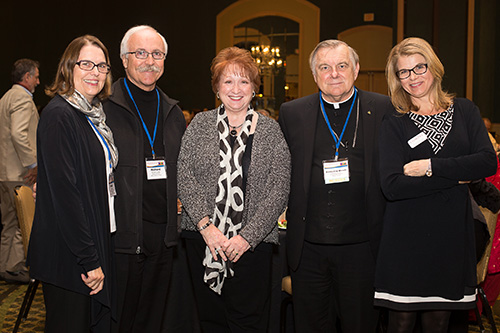
Photographer: TOM TRACY | St. Augustine Dioces
Archbishop Thomas Wenski poses with the staff of Catholic Charities agencies in Miami and St. Augustine dioceses, including Deacon Richard Turcotte, director of Catholic Charities for the Archdiocese of Miami, second from left; Laura Hickey, center, director of Catholic Charities for the Diocese of St. Augustine; and Michelle Karolak, far right, director of Refugee Resettlement Services for Catholic Charities in St. Augustine. All took part in the 2015 Refugee Services Consultation sponsored by the Florida Department of Children and Families.
FC: Any regional historical events that you think you will most remember?
The thing closest to my heart will be Operation Pedro Pan. I lived as a child through that experience as an outsider looking in, as a church member and through my family and through my dad’s own outreach through St. Vincent de Paul (Society)… And to come back here in 1998 and experience it on a whole different level, to meet the children who had now grown into adults who were my age for the most part and to have a whole different experience with them and journey with them. I think Pedro Pan will always be the dearest and closest to my heart.
FC: There is a large partnering aspect to the Catholic Charities operation. Is that growing?
It is even more of a challenge nowadays. There is less money available for funding, so we need to find collaborative ways of working within our own agency to leverage resources so that we don’t replicate what we are doing between the various services. But it also requires a leveraging of what we are doing with other agencies … We always talk about doing a better job with parishes but our outreach at parishes where we have programs and services has been very positive. We have some very positive experiences, with Key West at the basilica there, at Notre Dame d’Haiti Parish and at Holy Redeemer Parish, through our counseling services, through child development services, through unaccompanied minors services. All of those services are integrated on some level with parishes… I have an operating principle here: I never say ‘no’ to a parish. If Catholic Charities can’t fulfill (the request) we will find somebody in the community who can. So if a pastor, or a priest or secretary calls from a parish, or a school calls, we aren’t going to say ‘no.’ We are going to take it on and case manage it for them and see them through the process.
FC: What about homeless as a growing challenge in South Florida?
When you look at homelessness, there are a continuum of services: traditional emergency shelter where you take people off the street and house them in many different ways. Then there is transitional housing and you prepare the person for permanent housing and finally there is permanent housing, much of it funded by federal or state homelessness funding. We have provided services in all three of those areas over the years, but I believe we have ultimately found our niche: What we do best is workforce affordable housing for people who at one time may have been homeless and are now employed and need affordable housing. We have 12 units of affordable housing at St. Bede’s Village in Key West. We are adding 37 new units there. We have 15 units in Miami Dade and are adding 15 more units to that at New Life facility.
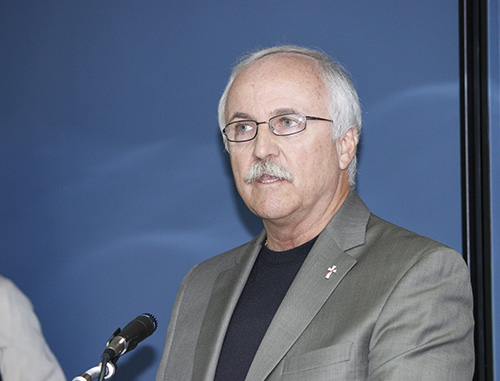
Photographer: ANA RODRIGUEZ-SOTO | FC
Deacon Richard Turcotte is pictured here at a 2014 press conference speaking about unaccompanied minors that were coming through the U.S.-Mexico border, some as young as 7, fleeing economic oppression, gang violence and drugs. "What we can't lose sight of are the children's stories," he said.
FC: Can you talk more about those new housing units for the homeless?
These new housing program units in Key West and Miami will be built debt free. When you carry a debt on housing it is a tremendous burden on the program. The construction and the planning has begun and we are at the phase where we are ready (for groundbreaking). I won’t be here to see the final results but it launches us into a niche area of housing that I think is really the future for Catholic Charities. It worked out that we have a developer who is building across the street who wants the New Life property and we asked him to rebuild what we already have better and in a new location. We went through two years of conversations and he is funding the whole project and doubling the capacity.
FC: What about the post-Hurricane Irma housing situation in the Florida Keys?
There has always been a housing crisis in the Keys, and I don’t know that there is a comprehensive plan to this day as to how to solve it. When you look at Key West it is number five as a city with the most disparity of top earners and everyone else. Over the years there has been a difficulty filling the gap of housing for the service industry and the hurricane only compounded that problem. Not that the hurricane destroyed affordable housing but at the same time the hurricane hit there were hundreds of affordable housing units that were expiring through a sunset clause, and what was affordable is no longer affordable. Now they can charge market price. Most of your service workers don’t live in Key West, they live further north. You have teachers, firemen, policemen who are having difficulty finding affordable housing.
FC: Is there another area of need that stands out as urgent to our region?
I would be remiss not to mention the opioid epidemic, however Miami has a rich history, and St. Luke’s started out as a methadone clinic. Now it has transitioned into a dual diagnosis facility for substance abuse and mental illness treatment. We have seen an increase of the opioid addicts coming in to St. Luke’s and that is commensurate with what we are seeing nationwide and in South Florida.
FC: Anything else that stands out as timely?
I think the challenge for us and for social service agencies throughout South Florida is that you can’t be one dimensional. When someone comes in with an issue of not meeting their mortgage or paying their rent or utilities, that is a symptom. We have to get better as a social service group of agencies at treating everybody holistically, looking at the whole person and that what brought them today to our doors was a crisis precipitated by something… We are doing that in our child development centers where we have opened … basically a resource center (in each one) where families receiving services and in the community can come in and access a number of different resources, whether applying for aid, food stamps, welfare, social security, a driver’s license, emergency financial services, food.
FC: Can you talk about Catholic Charities fundraising?
The (archdiocesan) Development Office does two fundraisers for us every year, the Archbishop’s Motorcycle Ride and the Cigar Night. We used to do a gala every year but we figured out that it was easier for the programs to do fundraisers because of the local flavor that they have and so the programs have been very creative as to how they do fundraising. Some of them have walks, sell T-shirts, have vending machines, bake sales and things like that. By each program doing a fundraiser we end up netting upwards of $150,000. We had a big 75th anniversary celebration but we don’t do a fundraising strategy or effort so we rely on the Development Office to help in those areas.
FC: A word about your successor?
Peter has been my friend and equal for 20 years and I couldn’t think of a person better qualified in character, in his spirituality, and in his loyalty to Catholicism to take this position. I think Peter will take the agency to whatever heights the circumstances around the agency allow them to rise. I see Peter as being a progressive leader, a loyal leader, and 100 percent dedicated to Catholic Charities… I don’t think we could have found a better person.
FC: What things will you be doing in retirement?
I have seven grandchildren and an eighth on the way and I will spend a lot of time catching up with them. I play at (being a) golfer and (am) a cyclist who rides at least 75 to 100 miles a week. I take long distance bike rides so I have a lot to keep me occupied.
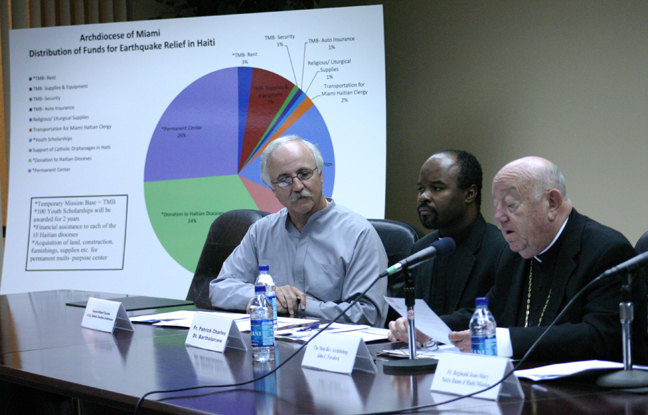
Photographer: ANA RODRIGUEZ-SOTO| FC
Deacon Richard Turcotte is pictured here at a press conference March 11, 2010, when archdiocesan officials announced a long-term plan to aid Haiti after the January 2010 earthquake. A chart showing how that money will be spent is visible behind Deacon Turcotte, Father Patrick Charles, now pastor of St. Stephen in Miramar, and Archbishop Emeritus John C. Favalora.
This article has been corrected to accurately reflect the length of time Deacon Richard Turcotte has served as CEO of Catholic Charities in Miami. It's 20 years, not 30.
